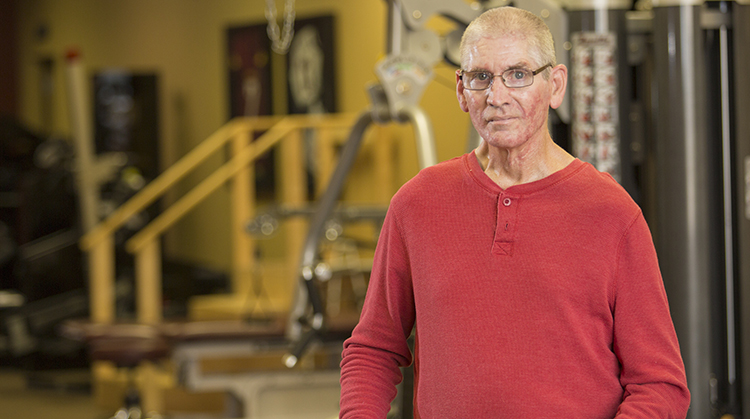
Nate Anderson's pain medication gets automatically pumped into his body a little bit at a time each day.
The drugs are strong—a combination of morphine (an opioid pain reliever) and baclofen (a muscle relaxer)—but then so is Nate's pain.
"I'm probably not the worst case scenario," Nate says, "but I'm probably in the top 10% of people who have had to use some pretty nasty narcotics to just get by on a day-to-day basis."
In 2012, Nate was in a car accident that injured his neck. In 2016 he had fusion surgery to fortify his spine with 2 metal rods and 14 screws.
The drug pump "takes the edge off of the worst of the pain," Nate says, but for additional relief he relies on treatment from a physical therapist. "I can do my (physical therapist-prescribed home exercise program), and that's fine and good, but you still need to have support and people around you."
Nate says that visiting his physical therapist, Stephanie Weyrauch, PT, DPT, near his home in Thief River Falls, Minnesota, benefits more than just his physical health. It improves his emotional and mental health, too.
"It gives you hope and drive to not only make yourself better, but to show others that you're not just sitting back and not trying," Nate says.

Sitting back has never been Nate's style.
He first received physical therapy at age 2 to address the effects of cerebral palsy, which led to partial paralysis. Now 56, Nate has less than 50% use of the left side of his body, and he's certain his mobility would be much worse if not for years of physical therapist treatment, both before and after his car accident.
"I have succeeded in a lot of things that I shouldn't have been able to do because of physical therapy," Nate says. "If I hadn't had therapy, I would have been in a wheelchair and never gotten out of one."
When Nate was a child, his father worked 2 jobs—as a college professor and cutting down trees for a logging company—to cover Nate's "astronomical" medical expenses. Now Social Security Disability Insurance provides Nate with Medicare, but the therapy cap limits the kind of care he can receive. And Nate finds that troubling, even dangerous.
"I'm not a person that wants to live on narcotics," Nate says. "In the beginning I even used alcohol as a means of (managing pain and depression), and that's not a good thing either. We have alcoholics in our family, and as a result of it I'm a recovering one myself."
What Nate wants is to continue his physical therapy, which improves his mobility while helping him manage his pain, anxiety, and depression. He shudders to think of what his life would be like without the physical therapist treatment he's received.
"I don't know where I'd be; I don't want to know," Nate says. "I'm almost certain that I would not be here today."
Nate initially shared his story because of a Medicare therapy cap that left him without any more allowed visits to his physical therapist, despite the help it provides. He wanted his story to inspire Congress to repeal the problematic Medicare therapy cap. (Congress has since repealed the cap so people like Nate can get the care they need)*.
"A lot of people have commended me for what I've been through," Nate says. "They tell me I've inspired them to do more themselves."
Nate has inspired others through his active pursuit of better health through physical therapy, as opposed to passive consumption of prescription drugs to mask the pain.
Update
*On February 9, 2018, Congress eliminated the hard cap on outpatient physical therapy services under Medicare as part of the Balanced Budget Act of 2018, removing barriers to care for patients like Nate.
Physical therapists are movement experts who improve quality of life through hands-on care, patient education, and prescribed movement. You can contact a physical therapist directly for an evaluation. To locate a physical therapist in your area, visit Find a PT.


